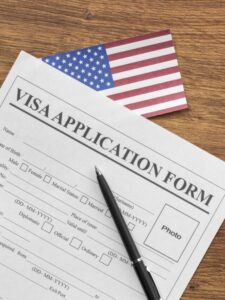The South Korean government has proposed new regulations allowing international students to work longer hours to enhance the study and employment experiences of international students. The project aims to foster a more inclusive environment while giving students more financial freedom to pay for their education and living costs.
The conditions, which took effect on July 3, are meant to draw in more international students after problems reportedly caused the Study Korea 3.0 plan to be delayed until the end of July.
The financial “screening” requirements when a student applies for a student visa will be reduced, according to a recent announcement from the Ministry of Justice (MOJ).
Leap Advantage Virtual Spot Offer Event on May 10th 2024

Last call to secure your spot for Masters in US for Fall ’24 Intake
Leap Advantage Virtual Spot Offer Event on May 10th 2024
Last call to secure your spot for Masters in US for Fall ’24 Intake

Benefits
Education
- A student visa’s financial requirements will be loosened. Prior to this, students pursuing degrees had to show a minimum of $20,000 (16,42,250 INR). The revamped mechanism will convert the cash to Korean won, with the new threshold for degree students being 20 million won, or around $15,400 (12,64,533 INR).
- Importantly, if the students apply to universities outside of major metropolitan regions, the threshold will drop to 16 million won or $12,542 (10,29,855 INR) for overseas students considering various universities in South Korea.
- For students taking language classes, the minimum fee is reduced to just 10 million won, or roughly $7,700 (6,32,266 INR).
Work
- Increasing the number of hours that international students may work. Students will now be allowed to work up to 25 hours a week instead of the previous 20-hour limit.
- International students can pursue internships in their chosen field of study during university breaks in addition to conventional part-time jobs.
- Regarding the extension of working hours by an additional five hours per week for people with higher grades and Korean language proficiency
- The final measure enables foreign students to participate in their “mandatory field practice” in accordance with regulations established by the Ministry of Education (MoE), and grants them the same chances for practice as Korean students without the need for a work visa.
Want to know more about Studying in South Korea? Check out these blogs
- Scholarship for Indian Students to Study in South Korea: Check Updated List 2024
- Seoul National University International Scholarship For Indian Students: Eligibility & Tips
- Korean SAT Exam 2022: CSAT Overview, Syllabus & Difficulty
Conclusion
Overall, these new policies in South Korea will increase access to education and enhance the study abroad experience. The nation wants to draw a broad group of students and offer them beneficial possibilities for personal and professional growth by decreasing financial thresholds and enhancing employment rights. By implementing strict rules and preserving open connections with partners, South Korea can create a viable, mutually beneficial environment for overseas students and the local population.
Frequently Asked Questions (FAQs)
Q. What are the visa requirements for international students in South Korea?
To study in South Korea, international students typically need to obtain a student visa, which is known as the D-2 visa. The requirements for the D-2 visa may include an admission letter from a recognized educational institution, proof of financial capability, a valid passport, and a completed visa application form. It is advisable to consult the South Korean embassy or consulate in your home country for detailed and up-to-date visa requirements.
Q. Are there any language requirements for international students in South Korea?
Language requirements may vary depending on the educational program and institution. Some institutions may require international students to provide proof of proficiency in the Korean language, while others may offer English-taught programs or have separate language programs for international students. It is essential to check the language requirements of the specific educational institution you are interested in.
Q. Are there any scholarships available for international students in South Korea?
South Korea offers various scholarships to support international students. The Korean government provides scholarships such as the Global Korea Scholarship (formerly known as the Korean Government Scholarship Program) for outstanding international students. Additionally, many educational institutions in South Korea offer their own scholarships and financial aid programs. The eligibility criteria, application procedures, and deadlines may vary, so it is advisable to visit the official websites of the respective scholarship programs or contact the educational institutions directly for detailed information.
Q. How can international students find accommodation in South Korea?
Finding accommodation in South Korea can be done through various means. Some educational institutions offer on-campus dormitories or affiliated housing for international students. Alternatively, students can explore off-campus options such as renting apartments, studios, or shared houses. Online platforms and real estate agencies can assist in finding suitable accommodation. It is recommended to start the search early, consider factors such as location, cost, and amenities, and seek guidance from the educational institution’s international student office for housing resources and recommendations.







